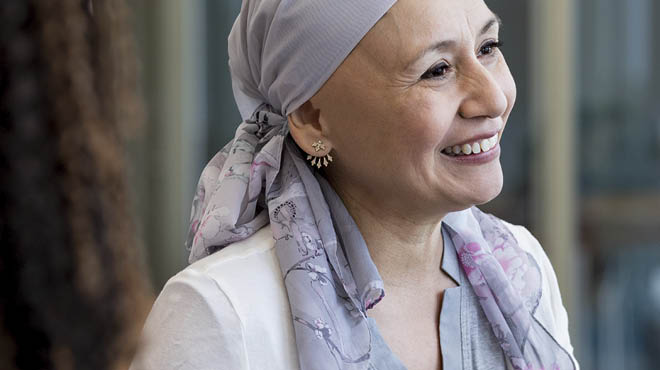Posted By

Alicia Ogle, A.P.N.P., R.N.
Obstetrics & Gynecology (OB-GYN), Reproductive Endocrinology (Fertility)
Recent Posts
-

-
 Speaking of HealthTrying to get pregnant? Select a lubricant most helpful for spermNovember 17, 2022
Speaking of HealthTrying to get pregnant? Select a lubricant most helpful for spermNovember 17, 2022 -

Fertility considerations in cancer treatment: Preserving hope for the future

When a person is diagnosed with cancer, the focus is often on immediate treatment and recovery. However, it's important to consider the long-term effects of cancer and its therapies on fertility. These treatments can significantly affect a person's reproductive organs, potentially altering their ability to have children in the future.
If you or a loved one is facing a cancer diagnosis, here's what you need to know about potential fertility implications.
Cancers with higher fertility risks
Cancer and its treatments can cause changes in your body. For some people, cancer damages a part of the reproductive process and affects fertility. For others, the necessary cancer treatments interfere with fertility. The likelihood that cancer treatment will harm your fertility depends on the type and stage of cancer, the cancer treatment method and your age at the time of treatment.
Cancers that are more common in women, or people with ovaries, of reproductive age have a greater risk of affecting fertility. This includes breast cancer, uterine cancer, cervical cancer, ovarian cancer, thyroid cancer and blood cancers like lymphomas.
For men, or people with testicles, cancers in the pelvic area or those that require chemotherapy have a greater effect on fertility. This includes prostate cancer, testicular cancer, lymphomas, thyroid cancer and colon cancer.
Cancer treatment
Certain cancer treatments can harm your fertility. The effects might be temporary or permanent.
Cancer treatment and its effects might include:
- Chemotherapy
This common cancer treatment targets and destroys active cells in the body. The ovaries and testicles, which are vital reproductive organs, contain a high number of active cells and are susceptible to damage from chemotherapy. This damage can affect the ability of the ovaries or testicles to produce viable eggs or sperm after cancer treatment, thus affecting fertility. Future fertility depends on various factors such as the type, duration and dose of chemotherapy and the patient's age. Patients who received alkylating chemotherapeutic agents may have higher risks compared to other medications. - Radiation
This therapy also can affect fertility, primarily when administered in the pelvic area at high doses. In some cases, patients may opt to have surgery to reposition the ovaries from the radiation field, reducing the risk of damage. - Surgery
Fertility also can be harmed by the surgical removal of the testicles, uterus or ovaries. - Other cancer medications
Hormone therapies used to treat certain cancers, including breast cancer, can affect fertility. But the effects often are reversible. Once treatment stops, fertility may be restored.
Preservation options
Various fertility preservation options may be available for cancer patients before they undergo cancer treatment.
- Freezing
For women, egg freezing or embryo freezing are standard practices, with minor differences depending on whether the patient has a partner or intends to use donor sperm. These methods involve hormonal stimulation with injections over a few weeks and retrieval of eggs from the ovaries. The eggs can be immediately cryopreserved or mixed with sperm for fertilization for the cryopreservation of embryos. - Cryopreservation
Another option is ovarian tissue cryopreservation, which involves removing and freezing part or all of an ovary. The ovarian tissue is divided into small strips and cryopreserved for future use. This method is particularly suitable for young girls who haven't reached puberty or women who need to start cancer treatment immediately. Men may consider sperm cryopreservation, which involves freezing and storing sperm for use at a later date. Testicular tissue cryopreservation also could be a consideration for boys before puberty. - Suppression
Ovarian suppression may be considered but is not a proven method of fertility preservation. Ovarian suppression involves medications temporarily suppressing ovarian activity, potentially protecting the ovaries from chemotherapy's effects.
During cancer treatment, radiation shields can protect fertility in men and women. This procedure places small lead shields over the ovaries or testicles to reduce the radiation exposure they receive. Proton radiotherapy also can preserve fertility by delivering targeted therapy and minimizing exposure to adjoining organs and tissues.
Timing considerations
If you are planning cancer treatment and want to preserve your fertility, talk to your oncologist and a fertility specialist as soon as possible. A fertility specialist can help you understand your options, answer questions and serve as your fertility advocate during your treatment.
It's important to know that some preservation options may be limited if you are facing an urgent treatment need or other significant time constraints.
The diagnosis of cancer and the treatment process can be overwhelming. However, you have options if you're concerned about how cancer treatment might affect your fertility. Don't wait. Talk with your care team about fertility preservation methods before you begin cancer treatment to help you make an informed choice.
Alicia Ogle is a nurse practitioner in OB-GYN in Eau Claire, Wisconsin. Jessica Bleess is a physician assistant in Reproductive Endocrinology and Infertility at Mayo Clinic in Rochester, Minnesota.


